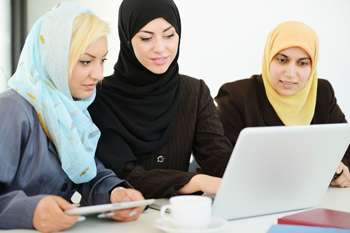Experts explore Middle East women's accumulation and use of social capital

Women in the Middle East and North Africa may fare less well than their male peers in accumulating "wasta," a form of social capital integral to their ability to exercise full political, economic and social influence, according to an issue brief from Rice University's Baker Institute for Public Policy.
"Working Those Connections: Exploring Arab Women's Differential Access to Opportunity in the Middle East and North Africa" was authored by two contributing experts in the Baker Institute's Women's Rights in the Middle East Program: Gail Buttorff, an assistant professor in the University of Kansas Department of Political Science, and Bozena Welborne, an assistant professor of government at Smith College. Both are available to discuss their findings with media.
Wasta has variously been defined in current scholarship as a "special influence by members of the same group or tribe" or "mediation and intercession" on the part of a specific individual or community. It is not perceived generally as corruption.
Possessing wasta allows individuals in positions of power the opportunity to grant assistance when requested, while others use wasta to streamline bureaucratic processes and gain access more easily to employment, relevant legal documentation (for example, driver's and business licenses, identity cards and passports), and even university admission, according to literature. In the political realm, wasta affords easier access to government contracts and helps navigate arcane and often arbitrary government institutions and rules.
In examining whether women and men have differential access to wasta, Buttorff and Welborne used the first wave of the Arab Barometer Survey, conducted from 2006 to 2007 across Algeria, Morocco, Jordan, Yemen, Lebanon and Palestine.
The authors found striking differences across the six countries surveyed in terms of the proportion of men and women who reported using wasta in the previous five years. Algeria, Morocco and Lebanon all demonstrated relatively similar levels of wasta usage across genders, although the overall usage rates varied across the three countries. In Jordan, Palestine and Yemen, by contrast, men and women exhibited dramatic differences in wasta usage. In Yemen, for example, 46 percent of men reported having used wasta, compared with only 29 percent of women.
The authors said it may not be an accident that the two countries in which women and men report equal wasta-usage levels (Algeria and Morocco) also happen to be states that have the most women in formal political positions. Today female legislators account for 17 percent and 32 percent of the Moroccan and Algerian parliaments, respectively.
"It seems to signify that the gendered nature of wasta certainly varies across contexts," the authors said of their findings. "Surprisingly, men and women do not differ substantially in wasta usage across basic demographic characteristics such as age, education and marital status overall. More of the interesting variation in wasta usage and demographics is perhaps found across countries than across genders. Women and men do, however, differ in terms of the reported usage, specifically in Jordan, Palestine and Yemen, and the types of wasta used."
The authors said the next line of research should explore whether the outcomes of wasta usage are qualitatively different for men and women. "Investigating this important topic allows scholars of the Middle East and North Africa to research the types of social capital accessible to women and whether these translate into socio-political and economic influence over time," they said.
More information: The brief is available online: bakerinstitute.org/media/files … 71715-WRME_Wasta.pdf
Provided by Rice University














